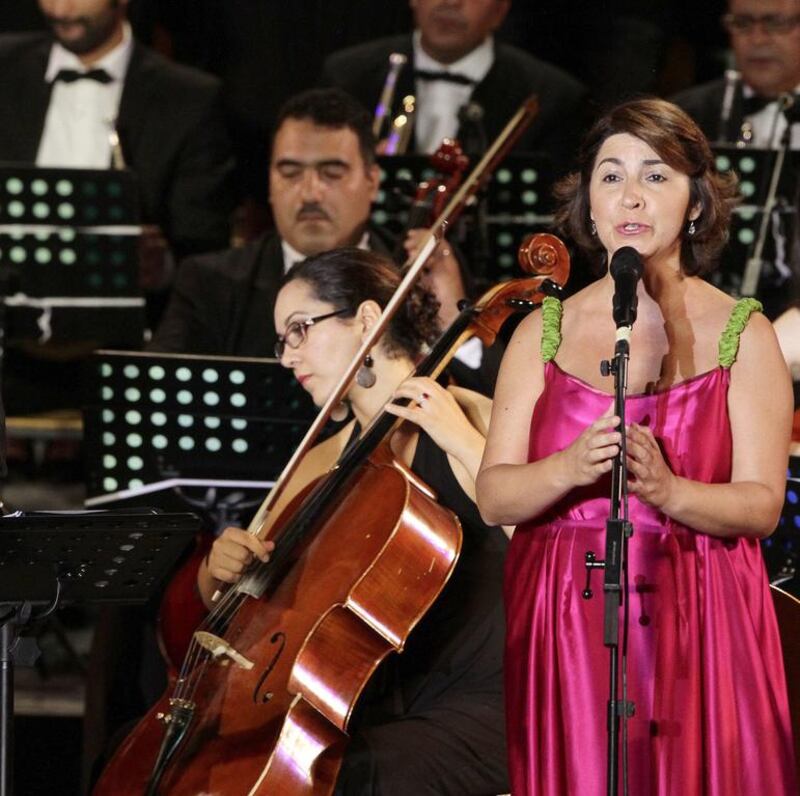The Sharjah World Music Festival hosts its final concert on Monday, January 26 with one of the first artists to ever tour the emirate. The Lebanese chanteuse Oumeima El Khalil, best known for the Arab folk favourites Ouhibouka Akthar and Asfour, will close the event with a performance at the Flag Island Amphitheatre, ending more than a week of shows ranging from jazz and fusion to opera.
El Khalil, who was honoured to be the festival’s closing act, was pleased to see how Sharjah has grown in the cultural stakes over the decades.
“I have performed in the UAE a few times but my very first show was in Sharjah in 1983,” she recalls. “I remember just being surprised by the whole experience. I thought the Gulf would not accept or understand our music. I was blown away by the reception and it really opened my eyes to how open to the arts the UAE was and still is to this day.”
Student and master
El Khalil may have only been 17 years old at the time, but she was already a seasoned performer.
Born in the small village of Al Fakiha in Lebanon’s Bekaa Valley, Khalil exhibited vocal talent from such a tender age that at 7 her father asked the musician Marcel Khalife, who had recently graduated, to tutor her.
While Khalife was immediately impressed by her impromptu audition at his home, their eventual collaboration would wait for five years, due to Khalife’s blossoming career in France and the Lebanese Civil War.
Upon returning to Beirut in 1979, Khalife immediately invited El Khalil to join him as a soloist on a regional tour and a 16-date American run. El Khalil says her teenage years with Khalife remains the most influential period of her artistic life. “The thing with Marcel is that he is a very level-headed person,” she says. “He was never a dictator in the studio and stage. He didn’t treat me like I was just a little girl and wouldn’t raise his voice. He was very patient with me and allowed me to express myself the way I wanted. He always told me to plan my career how I wanted but to make sure that each project took me forward.”
The songbird
While El Khalil continues to collaborate and perform with Khalife, she launched her solo career in earnest in 1994 with her successful debut album Khallini Ghannilak, a collection of baroque Lebanese folk songs.
El Khalil remains proud of her debut. She explains she felt more of a responsibility than fear when singing the words of crowd favourites such as Al Kamanjat and Dima, which were written by the renowned Arab poets Mahmoud Darwish and Mohamed El Abdallah, respectively.
“The way I felt was simple; I have a talent and I wanted to use it,” she says.
“Also, when I am singing these poems, I am thinking about how there is a chance I can help make these great people’s words reach as many as possible. That gives me inspiration to perform the best way possible.”
Mutual respect
Khalil’s knack for spotting great collaborations landed her the most important of partnerships: the Lebanese composer Hani Siblini, who would eventually become her husband.
The couple both worked together in producing El Khalil's fourth and latest solo album, 2013's evocative Zaman.
She and Siblini work well together because both appreciate the other’s boundaries. “People say that when you are married then two people become one,” she says. “I find that hilarious because that’s just not the case. I am not him and he is definitely not me.
“Both myself and Hani work well together because we both have independent thoughts and we respect each other. Yes, there are times where the personal creeps into the professional aspect of our lives and we clash. But, overall, we respect each other’s space. If we didn’t have that it would definitely spoil our relationship.”
Then and now
With a few shows in the Gulf and Lebanon already under her belt, 2015 will be a busy year for El Khalil.
As well as a steady flow of performances, she is working on separate collaborative albums with Khalife and Siblini.
When it comes to the former maestro, El Khalil says she will once again perform songs composed by Khalife and written by famed Arab poets. As for her new release with her husband, it would be a more forward-thinking, jazzy affair. It’s the dipping of toes in both past and modern styles that El Khalili enjoys most; she says it ultimately makes for engaging shows.
“Parts of my concerts do rely heavily on nostalgia and we all love to hold on to that,” she says.
“But there are some of my newer works with Hani that I think provides a balance. If people think of my concerts as a bridge between then and now, then that is fine with me.”
•Oumeima El Khalil performs on Monday, January 26 at the Flag Island Amphitheatre, Sharjah
[ sasaeed@thenational.ae ]











